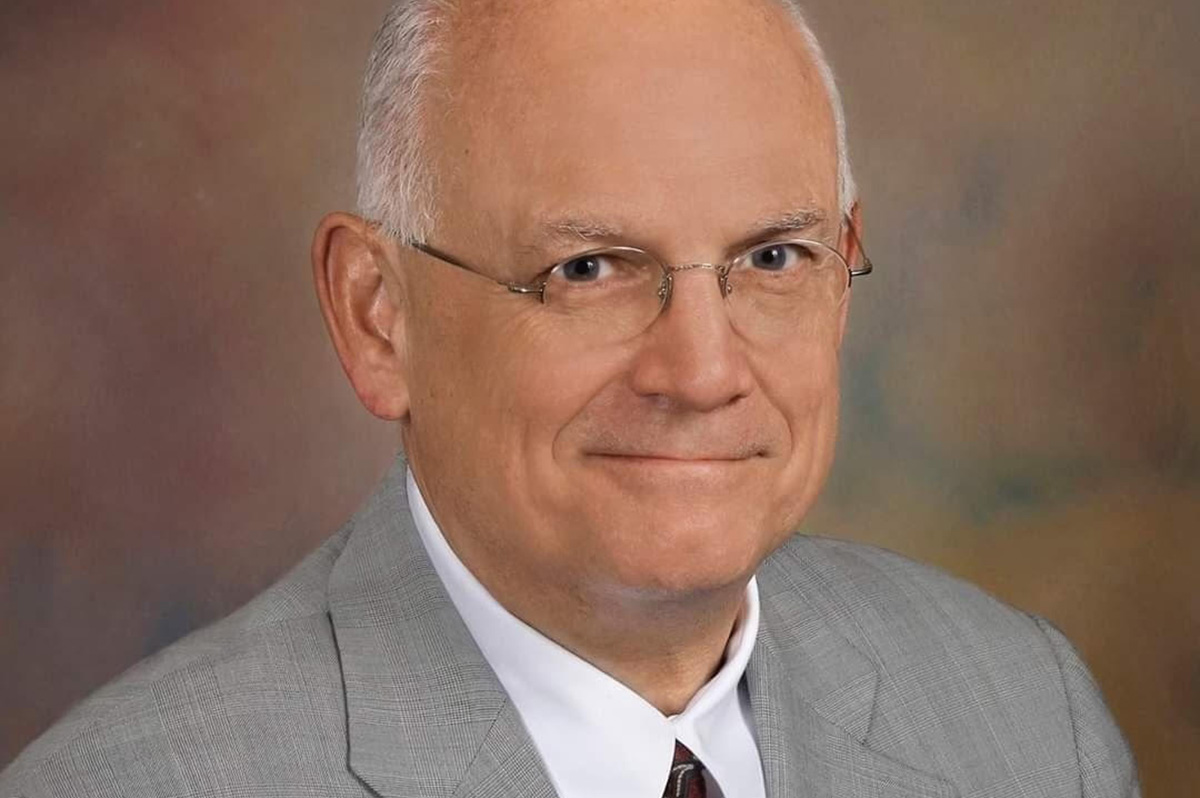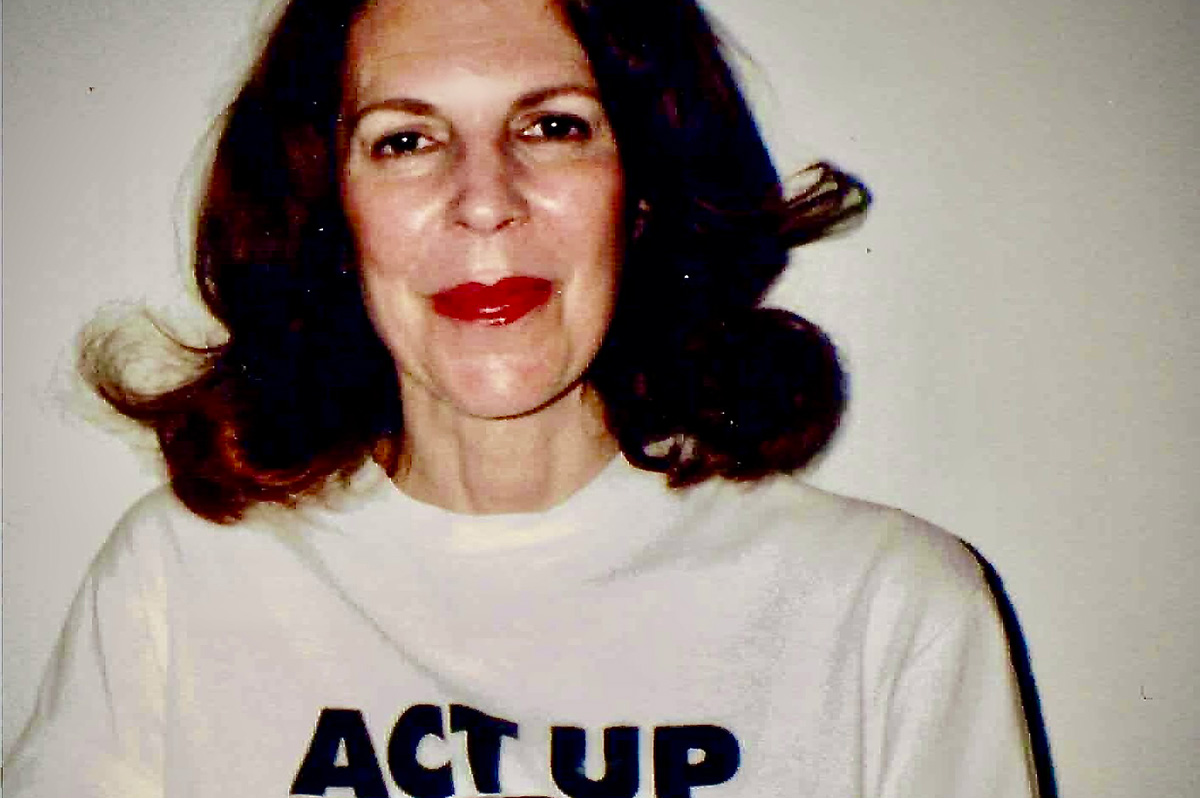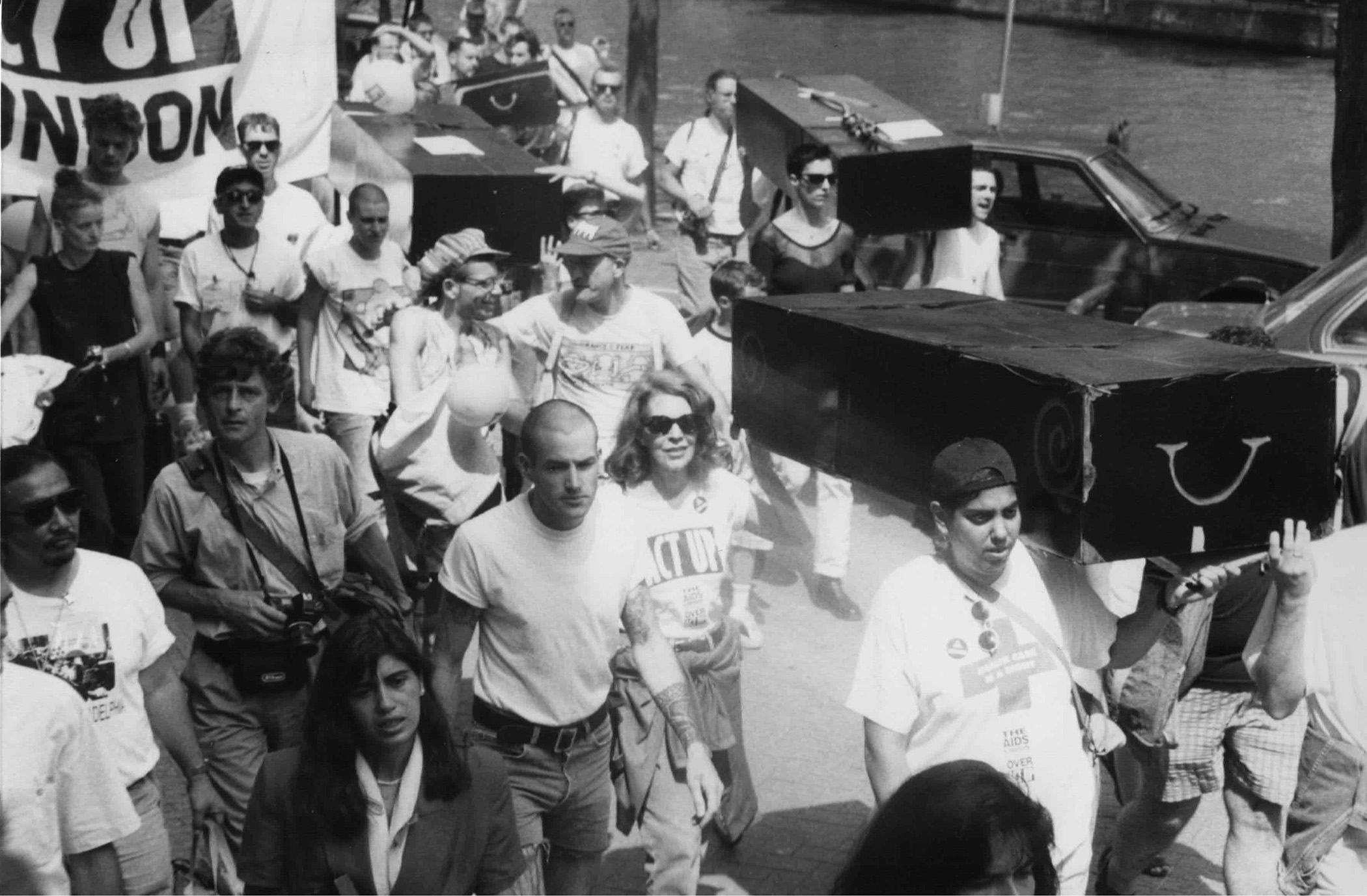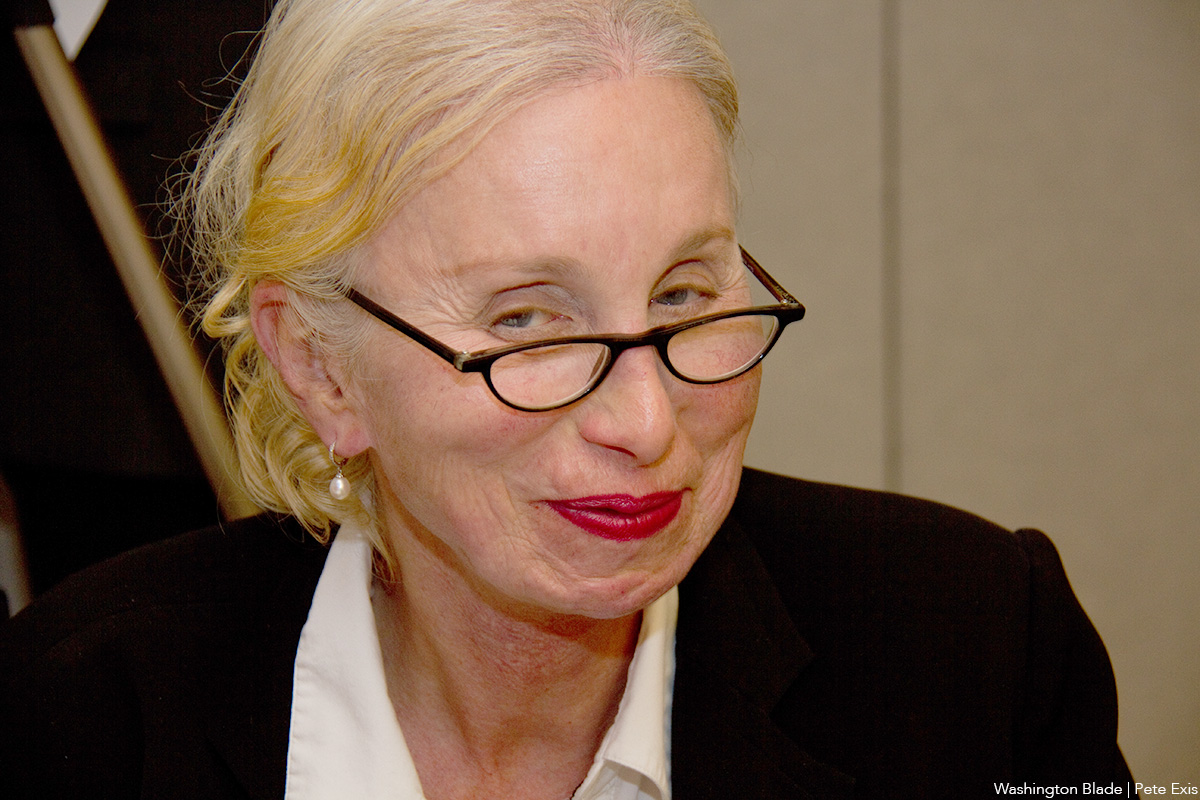Obituary
Gay baseball trailblazer Billy Bean dead at 60
MLB executive was last living former pro player to have come out

He achieved his lifelong dream of becoming a major league baseball player at 23, but Billy Bean gave it all up at 31 because he fell in love with another man. Bean, MLB’s senior vice president for diversity, equity and inclusion, died at home in New York on Tuesday after an 11-month-long battle with acute myeloid leukemia. Major League Baseball announced his death.
Bean was 60, and leaves a husband, Greg Baker.
Bean did not come out publicly until he left the game, in 1999, following an article in the Miami Herald that outed him. That led to even bigger stories in the New York Times and television interviews about being a closeted athlete. He wrote a book, “Going the Other Way.” For decades, Bean was the only living former baseball player to have come out as gay, following Glenn Burke.
Four years ago, Bean recorded an emotional video about coming out and how baseball has changed, titled “Dear Glenn Burke: A Letter from Billy Bean.”
However, the biggest impact Bean had on the game and on all professional sports came in 2014, when he was hired by former Commissioner Bud Selig to be MLB’s first ambassador for inclusion. He spent more than 10 years working for MLB, eventually being promoted to senior vice president.
Bean worked with pro baseball players and their clubs to, in his words, “advance equality for all players, coaches, managers, umpires, employees, and stakeholders throughout baseball to ensure an equitable, inclusive, and supportive workplace for everyone.”
The California native’s athletic career started as a two-time All-American outfielder at Loyola Marymount, then Bean played six seasons of pro ball. He was drafted by the New York Yankees in 1985, but returned to Loyola for his senior year, leading the team to the NCAA Men’s College World Series.
The Detroit Tigers drafted him the following year, and Bean made his debut in 1987 with a four-hit performance that tied a record for a player in his first game. Bean went on to play for the Los Angeles Dodgers, the San Diego Padres, in Japan as well as in the minor leagues.
But he hung up his mitt in 1995, when the lefty outfielder — who at that time was married to a woman — lost his first partner, Sam. He died of HIV-related causes in Bean’s final season. They had fallen in love on a road trip in Miami.
That 1999 Miami Herald article that outed him was a review of the restaurant he co-owned with his partner at that time. He had already told his parents in 1996, but Bean once told the LGBTQ sports site Outsports he still regretted ending his career in the closet.
“If I had only told my parents, I probably would have played two or three more years and understood that I could come out a step at a time, not have to do it in front of a microphone. And I was completely misguided. I had no mentor. I think that’s where the responsibility comes in for people who have lived that experience, and we take for granted that everybody’s adjusted and gets it. I had no one to confide in and that was the biggest mistake of my professional life was to think that if one person knew, everybody knew.
Just having some kind of ally at that time, I think I would have changed and I think I would have played so much better. You can appreciate the degree of despair when you’re hiding something and you’re on the bubble as it is. It just was a really frustrating time for me.”
At MLB, Bean led the charge for baseball teams to hold Pride nights, especially following the COVID-19 pandemic.
“The beginning of Pride month alongside fans returning to our MLB ballparks is tremendously exciting,” Bean told the Los Angeles Blade in June 2021. “The past year has been difficult for everyone, and I am so appreciative that our clubs are able to reach out and support the LGBTQ community in such a positive way.”
The league, baseball teams, his alma mater and LGBTQ advocates and allies posted remembrances and tributes to Bean on social media following news of his passing.
We are deeply saddened by the passing of our friend and colleague Billy Bean, MLB’s Senior VP for Diversity, Equity, & Inclusion and Special Assistant to the Commissioner. Billy, who fought a heroic year-long battle with Acute Myeloid Leukemia, was 60.
Over the last 10 years,… pic.twitter.com/dCfFM6hQlE
— MLB (@MLB) August 6, 2024
We mourn the passing of Billy Bean, a former Dodger and pioneering executive who as MLB’s Senior Vice President for Diversity, Equity & Inclusion truly elevated the culture and spirit of the game he loved. pic.twitter.com/fFykeWFWbi
— Los Angeles Dodgers (@Dodgers) August 6, 2024
We mourn the passing of our friend and former Padre, Billy Bean. He was a great ambassador for equality and inclusion in the game of baseball, and our thoughts are with his loved ones at this very difficult time. pic.twitter.com/D2sFHSVLhO
— San Diego Padres (@Padres) August 6, 2024
The #SFGiants are deeply saddened to learn of the passing of Billy Bean and join the rest of the baseball community in mourning this incredible loss.
We thank Billy for supporting and creating a more inclusive baseball environment and using our collective platform to elevate… https://t.co/tNdMQYCKHk
— SFGiants (@SFGiants) August 6, 2024
We join the entire baseball community in mourning the passing of Billy Bean.
Our hearts go out to the Bean family at this time. 💚💛 https://t.co/6TgKhC5QXp
— Oakland A's (@Athletics) August 6, 2024
The Washington Nationals join Major League Baseball and its Clubs in mourning the passing of Billy Bean.
It was an honor to host him at Nationals Park for our annual Night OUT in 2023, and we thank him for the many contributions he made to our game. pic.twitter.com/8t47tRhhfj
— Washington Nationals (@Nationals) August 6, 2024
The Tigers organization extends its deepest condolences to the family and friends of Billy Bean, who made his Major League debut with the Tigers in 1987 and spent three seasons wearing the Olde English ‘D’. https://t.co/BiB0pKpEbj
— Detroit Tigers (@tigers) August 6, 2024
Billy Bean brought all of his heart to this game. His courage changed baseball for the better, championing inclusivity and belonging.
Thank you for your friendship, energy and inspiration. You made us a better organization. We will miss you. ❤️ https://t.co/blhQNPJ2VO pic.twitter.com/EpBluffmYM
— Red Sox (@RedSox) August 6, 2024
Billy Bean left an indelible mark with his kindness, sincerity and tireless efforts to advance the causes of diversity and inclusion in baseball. The Players Association extends its heartfelt sympathies to his family and friends throughout the game. pic.twitter.com/6KHvcv4ZcR
— MLBPA (@MLBPA) August 6, 2024
The LMU community mourns the passing of Lions baseball legend Billy Bean.
The two-time All-American led the Lions to their sole appearance in the College World Series in 1986.
Bean was inducted into the LMU Hall of Fame in 1992 and will forever be enshrined in Lions lore. pic.twitter.com/QwJbt3Rfhp
— LMU Baseball (@lmulionsBSB) August 6, 2024
I just learned that Billy Bean is now gone on the same day we buried my father. I always loved working with Billy because, former big leaguer that he was, he was committed to finding positive outcomes, ways to win, big or small, for all #LGBTQ athletes. We should all miss him. pic.twitter.com/F3d2EKjAtL
— Christina Kahrl (@ChristinaKahrl) August 6, 2024
It's a sad day for all sports. Baseball Legend Billy Bean, MLB’s Senior VP for Diversity, Equity, and Inclusion and Special Assistant to the Commissioner, has passed away. Billy, who was 60, fought Acute Myeloid Leukemia.
— R.K. Russell (@RKRelentless) August 6, 2024
Heartbroken to hear of Billy’s passing. A kind man with a formidable enthusiasm for creating change. I’m so grateful for all the times our paths crossed over the years. I’ll always cherish the wisdom he so generously shared that helped shape me into the man & advocate I am today. https://t.co/JtSQDKgMh8 pic.twitter.com/MxRjOJRfQX
— Merts (@ConnerMertens) August 6, 2024
Funeral arrangements were not announced as of press time.
Obituary
Local attorney, LGBTQ rights advocate Dale Sanders dies at 75
Acclaimed lawyer credited with advancing legal rights for people with HIV/AIDS

Dale Edwin Sanders, an attorney who practiced law in D.C. and Northern Virginia for more than 40 years and is credited with playing a key role in providing legal services for people living with HIV/AIDS beginning in the early 1980s, died April 10 at the age of 75.
His brother, Wade Sanders, said the cause of death was a heart attack that occurred at Johns Hopkins Hospital in Baltimore shortly after he had back surgery.
Wade Sanders described his brother as a “trial lawyer, passionate criminal defense, and civil litigator for human rights” for close to 50 years, with some of his work focused on “civil law, notably gay-related insurance discrimination during the AIDS epidemic.”
He called his brother “a zealous advocate for the oppressed, his clients, and his personal convictions.”
Born in Arlington, Va., and raised in McLean, Va., Dale Sanders graduated from Langley High School in McLean and received his bachelor’s degree from the University of Virginia, his brother said. He received his law degree from D.C.’s American University Washington College of Law and began his law practice in 1976 in Old Town, Alexandria, Wade Sanders said.
Amy Nelson, director of Legal Services for D.C. ‘s Whitman-Walker Health, said Sanders became one of Whitman-Walker’s original volunteer pro-bono attorneys in the 1980s.
“Dale was a beloved part of the legal services program and our medical-legal partnership for nearly 40 years,” Nelson said. “Dale was one of the clinic’s first volunteer attorneys at Whitman-Walker’s weekly, legal walk-in clinic offering free counseling to clients about their legal rights in the face of HIV/AIDS and LGBT discrimination from employers, landlords, medical providers, and insurance companies,” according to Nelson.
Nelson added, “Dale represented dozens of people impacted by the ignorance and prejudice attendant to an HIV/AIDS diagnosis, and his litigation wins were instrumental in advancing the legal rights of persons living with HIV/AIDS.”
Sanders’s most recent case on behalf of Whitman-Walker took place in 2023 in support of a transgender woman in Virginia who faced discrimination from her employer and health insurer, Nelson said.
In 1989, Whitman-Walker presented Sanders with its Gene Frey Award for Volunteer Service, and in 1994 presented him with its Founders Award for Pro Bono Legal Services, Nelson told the Blade. She said in 2024, Whitman-Walker re-named its annual Going the Extra Mile Pro Bono Award as the Dale Sanders Award for Pro Bono Excellence.
“Dale’s legacy helped to shape HIV/AIDS law, and his fierce commitment to justice will live on at Whitman-Walker Health,” Nelson said in a statement. “We will miss him dearly.”
Daniel Bruner, who served as Whitman-Walker’s legal services director prior to Amy Nelson taking that position, said Sanders played a role in shaping his own legal skills and knowledge.
“Dale was one of my earliest legal models among local, and national, advocates for people living with HIV and LGBT people,” Bruner told the Blade. “He was a fierce, persistent advocate for his clients and for the community,” Bruner said, adding, “He won key victories in several cases where employees’ or health care patients’ privacy had been egregiously violated. I certainly will never forget him.”
Wade Sanders said his brother was also an avid bridge player, saying he played competitively. “He earned the rank of Ruby Life Master, a pretty big deal in the bridge world,” Wade Sanders said.
Dale Sanders is survived by his husband, Christian Samonte; his sister, Joyce Sanders of York, S.C.; his brother Wade Sanders of West Jefferson, N.C.; and his beloved dogs Langley and Abigail, his brother said in a statement.
A memorial service for Dale Sanders organized by the Sanders family and the LGBTQ Catholic group Dignity Washington will be held Saturday, May 10, at 1 p.m. at St. Margaret’s Episcopal Church at 1830 Connecticut Ave., N.W. in D.C., a Dignity Washington spokesperson said.
Obituary
Nanette Kazaoka, an unlikely AIDS activist, dies at 83
Member of ACT-UP, longtime social justice advocate

Nanette Kazaoka, a well-known figure in the fight for HIV/AIDS awareness and the rights of marginalized communities, passed away on Oct. 2 at her home in New York City. She was 83. The cause of death was complications from vascular dementia and Alzheimer’s disease, according to a statement from her daughter Kelly Kochendorfer.
Kazaoka was an advocate for justice, particularly in the early days of the AIDS crisis, when she became a member of the AIDS Coalition to Unleash Power, or ACT-Up. She is perhaps best remembered for her participation in a 2004 protest in front of Madison Square Garden during the Republican National Convention, when she and 11 fellow activists staged a dramatic naked demonstration, demanding debt cancellation for impoverished countries, according to a statement from the family.
“Bush, Stop AIDS. Drop the Debt Now!” they chanted, with slogans stenciled in black paint on their bodies. The bold protest drew national attention and underscored the urgency of global debt relief as a key element in the fight against AIDS.
She was born Nanette Natalina Bottinelli on June 12, 1941, in New York City. Her father, Angelo, worked as a waiter at the St. Regis Hotel, while her mother, Betty McComb, was a part-time burlesque dancer.
She married her first husband, Fred Kochendorfer, in 1963, and they had two children together, Kim Skrobe and Kelly, both of whom survive her.
Kazaoka’s journey to Fire Island marked a transformative period in her life. Kochendorfer wanted to live there, and so they began renting in 1967. Kazaoka then made a bold decision that would shape her future: She left her husband for another man and began living on Fire Island in 1968-1969, with the children attending school in Ocean Beach, according to the family’s statement.
This period coincided with the early days of the gay rights movement, as Fire Island was emerging as a hub for LGBTQ culture. Her experiences during these years contributed to the strong sense of activism and solidarity that would later define her role in ACT-UP and the broader fight for LGBTQ rights.
Kazaoka’s second husband, Katsushiga “Kats” Kazaoka, a Japanese-American psychologist who had been interred during World War II, died of cancer in 1984, pushing her to enter the workforce as a receptionist while studying occupational therapy at Downstate Medical Center. By 1990, she had earned her degree and sought work with AIDS patients.
In 1988, a close friend introduced her to ACT-UP, sparking the start of her full-time dedication to AIDS activism, the family said. Kazaoka became known for her passionate, unrelenting activism, whether protesting at City Hall or challenging anti-LGBTQ policies at St. Luke’s Hospital.
Kazaoka’s activism spanned 35 years, making her a beloved and respected figure within ACT-UP and beyond, the family noted. She was featured in Sarah Schulman’s “Let the Record Show: A Political History of ACT-Up New York, 1987-1993” as well as “Act-Up Oral History, No. 162,” a digital history. She was the cover photo of “Fag Hags, Divas and Moms: The Legacy of Straight Women in the AIDS Community,” and was included in The New York Times T Living Magazine story, “LEGENDS PIONEERS AND SURVIVORS.
Her dedication to science continued even after her passing: She donated her brain to the Mount Sinai NIH Brain and Tissue Repository for research to advance the understanding of the human brain health and disease to help end dementia, the family said.
Along with her daughters, Kazaoka is survived by her son-in-law John Skrobe, granddaughter Stella Skrobe and daughter-in-law Christine Arax, all of New York. She and her third husband, Paul Haskell, divorced in 2000.

Local
D.C. LGBTQ rights advocate Jeri Hughes dies at 73
‘Force of nature’ credited with pro-trans policy at city jail

Jeri Hughes, a longtime D.C. transgender rights advocate who has worked closely with activists in support of the local LGBTQ community, died March 18 at her home after a seven-year battle with lung cancer. She was 73.
Hughes, who has worked for the past 11 years at the D.C. Department of Employment Services, most recently as a Workforce Development Specialist, became involved in local LGBTQ rights and transgender rights endeavors since she moved to D.C. around 2005.
Among other endeavors, Hughes, along with D.C. transgender rights advocate Earline Budd, has served for more than a decade on the D.C. Department of Corrections’ Transgender Housing and Transgender Advisory committees.
Budd this week said Hughes played an important role in ensuring that Department of Corrections officials continue to follow a 2009 policy of allowing transgender inmates to choose whether to be placed in the men’s or the women’s housing units at the D.C. jail.
“In her toughness and determination, Jeri was a force of nature,” said Rick Rosendall, former president of the D.C. Gay and Lesbian Activists Alliance. “She pressed the D.C. Department of Corrections for more humane and respectful treatment of transgender inmates,” Rosendall said.
“She pressed the D.C. government to set an example by hiring more trans people,” according to Rosendall, who added that Hughes interacted with D.C. police officials, including former D.C. Police Chief Peter Newsham, to push for respectful treatment of trans people by the police.
Hughes’s LinkedIn page shows that prior to working at the D.C. Department of Employment Services she served as housing coordinator for a local social services organization called T.H.E. Inc., where, among other things, she “monitored and mentored a diverse population of LGBT youth.”
Her LinkedIn page shows she also worked from June 2009 to May 2010 as an administrative assistant at the D.C. Anacostia Watershed Society.
Hughes’s brother, Lou Hughes, who said the Hughes family is originally from Ohio, told the Washington Blade Jeri Hughes served in the U.S. Navy after high school as a torpedo operator in a submarine in the South Pacific. He said a short time later Jeri Hughes moved to New York City, where she operated a company that provided commercial laundry service to restaurants and hospitals.
Lou Hughes said his sister Jeri moved to D.C. around 2005 and initially lived with him and his wife in a basement apartment in their house before moving to her own apartment in Northwest D.C. where she remained until her passing.
He said it was around 2005 that his sister informed her family that she planned to transition as a transgender woman at the age of 54. “And our family fully supported her decision, helped her finance the various surgeries,” Lou Hughes said. “And once she went through the transition it was like she was fully reborn.”
“And that’s why all these negative comments about transgender people right now – it’s very hurtful to our family because she was really the classic transgender person who was really simply born in the wrong body and gave our entire family a real sensitivity and understanding of what that meant,” Lou Hughes said.
Denise Leclair, one of Jeri Hughes’s closest friends and former roommate, said among Jeri Hughes’s many interests was boating. Leclair said Hughes persuaded her to join Hughes in purchasing a 45-foot sailboat in 2019, shortly after Hughes was diagnosed with lung cancer.
“We spent the next two months getting it fixed up and we started sailing,” Leclair recalls. “And we did quite a bit of sailing, so she really put her heart and soul into restoring this boat.”
Leclair said the boat was docked in a harbor in Deale, Md., just south of Annapolis. She said up until a few months ago, after her cancer prevented her from working full-time, Hughes spent most of her time living on the boat until her illness forced her to return to her D.C. apartment.
“My Dearest Sister Jeri, born April 30, 1951, left our restless Earth in the early morning of March 18, 2025, succumbing to the lung cancer which she battled against so bravely for seven years,” Lou Hughes says in a statement. “As we all know, Jeri was a person of high intellect, incredible energy and fearless in the face of adversity,” her brother wrote.
“Whether through acts of quiet charity, tireless advocacy, or simply offering a listening ear, Jeri made it a mission to uplift, support, and care for every person she encountered,” his statement says. “Her life was a testament to empathy in action, leaving a lasting legacy of love, hope, and selflessness that will continue to inspire all who knew her.”
In addition to her many friends and colleagues in D.C., Jeri Hughes is survived by her brother, Lou Hughes; sister-In-law Candice Hughes; daughter, Casey Martin; son-in-law Wally Martin; grandson Liam Martin; granddaughter, Mirella Martin; niece, Brittany Hughes; and nephew Klaus Meierdiercks.
A memorial service and celebration of life for Jeri Hughes is scheduled to be held May 10 at D.C.’s Metropolitan Community Church at 1 p.m., according to Earline Budd.
-

 Federal Government2 days ago
Federal Government2 days agoHHS to retire 988 crisis lifeline for LGBTQ youth
-

 Opinions2 days ago
Opinions2 days agoDavid Hogg’s arrogant, self-indulgent stunt
-

 District of Columbia2 days ago
District of Columbia2 days agoD.C. police seek help in identifying suspect in anti-gay threats case
-

 Opinions2 days ago
Opinions2 days agoOn Pope Francis, Opus Dei and ongoing religious intolerance












